This is the last article you can read this month
You can read more article this month
You can read more articles this month
Sorry your limit is up for this month
Reset on:
Please help support the Morning Star by subscribing here
Who Only Cricket Know
David Woodhouse
Fairfield Books, £22.00
THE British Caribbean was in a state of dangerous flux when Len Hutton’s team of English cricketers arrived in 1953 to play a Test match series against West Indies.
Tortuously slow moves towards independence were leading to frustration and unrest, agitation for majority rule was gathering apace, and the British had just imposed a military state of emergency on British Guiana after its democratically elected prime minister, Cheddi Jagan, had been judged too dangerously leftist to be entrusted with power.
David Woodhouse’s balanced and sympathetic account of Hutton’s ill-fated tour takes in all of this detail, and more, to show how the captain and his fellow tourists were doomed from the outset on a trip that was riven with misunderstanding, controversy and acrimony.
Woefully briefed before they went out, the touring side had no real conception of what they were walking into, leaving them badly prepared to negotiate the minefield over which they trod.
More concerned with in-house agendas than the political ramifications of their presence at a time of anti-colonialist agitation, over the five matches of the tour England’s players drew widespread criticism in the West Indies for overly aggressive fast bowling, foul language on the field, unseemly dissention over umpiring decisions, gamesmanship and deliberate slow play.
There were also allegations of racial insults, an unfortunate decision by Hutton to avoid off-field fraternisation with the opposition players, and a series of perceived snubs that culminated in the skipper being accused of ignoring the congratulations of Alexander Bustamante, nationalist chief minister of Jamaica, during the final Test in Kingston.
What the author characterises as the most controversial Test series outside of Bodyline was also marked by serious crowd trouble in British Guiana, suspected pitch tampering in Trinidad and the background noise of angry calls for an end to the traditional white captaincy of the West Indies team.
As a side issue, but also deeply entwined with the way that events unfolded, members of the touring side were wrestling with internal divisions as Hutton, a working-class Yorkshireman and first professional England captain of the 20th century, tried to hold his ground against the upper-class amateur hegemony of the MCC.
With impressive insight and immaculate research, Woodhouse creates a grippingly entertaining tale of touring intrigue that shows how sport can never be insulated from the wider social and political circumstances in which it is played.
That point was made many years ago by CLR James in Beyond A Boundary, and has been expanded upon by others since. But here is a very specific, and beautifully written, example of the calamities that can befall any sporting team that fails to “read the room.”











